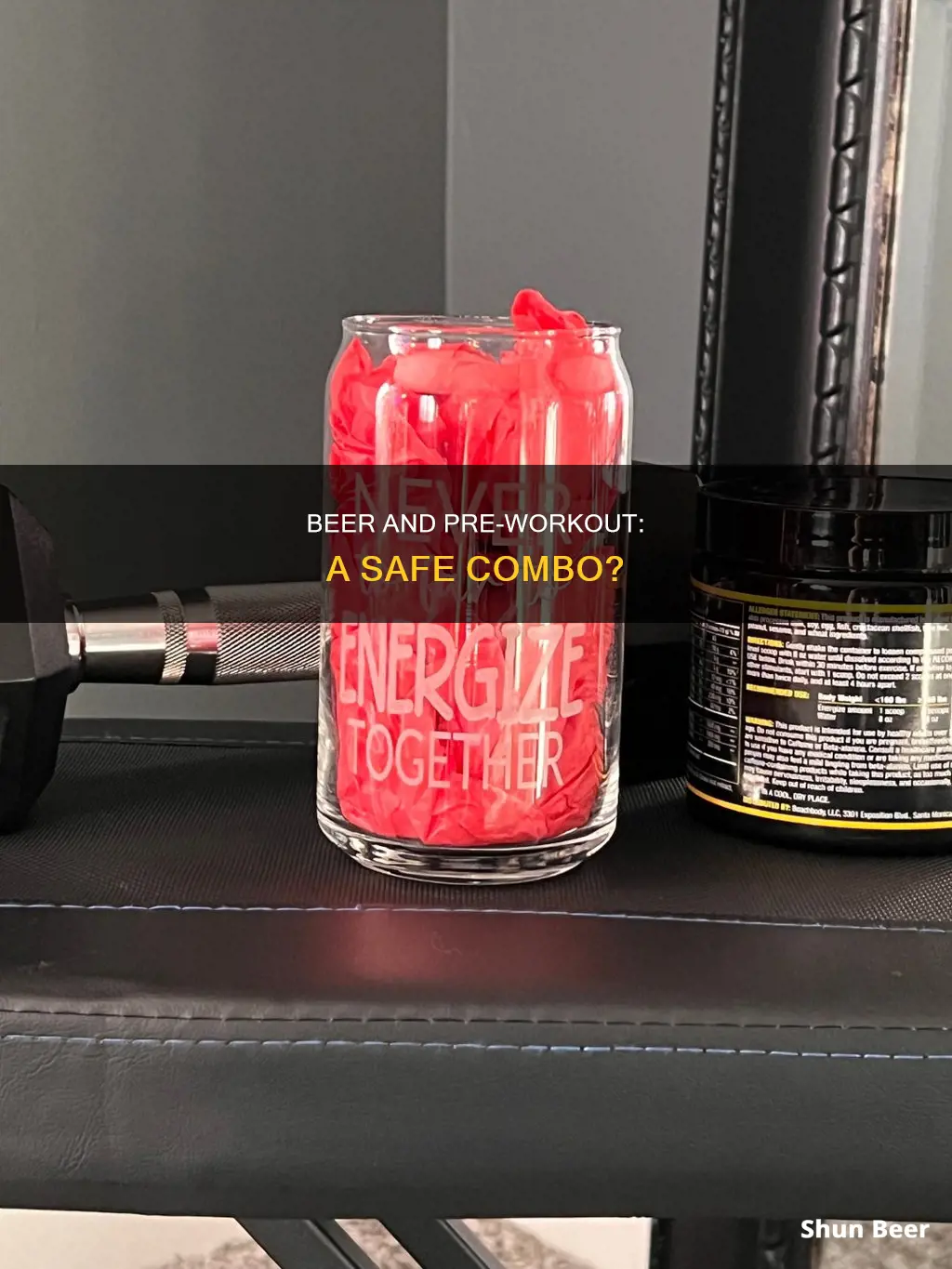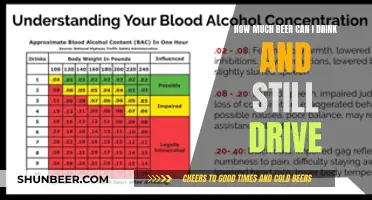
Pre-workout supplements are designed to boost energy and focus while exercising. They often contain caffeine, creatine, and amino acids. While it may be tempting to reward yourself with a beer after a workout, it's important to understand the potential consequences. Drinking alcohol can negate the effects of pre-workout supplements, as the liver prioritizes detoxifying alcohol over utilizing the nutrients in the supplement. This can lead to reduced effectiveness of the supplement and increased detoxification time. Additionally, alcohol and caffeine compete for detoxification in the liver, increasing the risk of liver damage. The negative effects of alcohol on cognitive function and coordination can also increase the risk of workout-related injuries. Furthermore, alcohol affects the body's ability to rehydrate and synthesize proteins for muscle recovery. While a beer or two may not significantly impact performance, regular alcohol consumption can lead to hangover-induced sluggishness and weight gain. Therefore, it is generally recommended to avoid drinking alcohol too close to taking pre-workout supplements and exercising.
What You'll Learn
- Alcohol can cause dehydration, impacting your body's ability to rehydrate and recover
- Alcohol and caffeine compete for detoxification by the liver, increasing the risk of liver damage
- Alcohol impairs cognitive function and increases the risk of workout-related injuries
- Alcohol reduces blood oxygen levels, impacting your muscles' ability to work aerobically
- Alcohol can negate the effects of pre-workout supplements, including increased energy and focus

Alcohol can cause dehydration, impacting your body's ability to rehydrate and recover
Alcohol is a diuretic, which means it makes your body produce more urine. This can lead to dehydration, especially if you don't drink enough water alongside alcoholic drinks. Dehydration can be dangerous, and even life-threatening in severe cases.
When you drink alcohol, your body prioritises dealing with the toxins it produces over other functions, such as producing glucose or clearing lactic acid. This can impact your body's ability to rehydrate and recover after exercise.
Alcohol also reduces the amount of vasopressin your body makes. Vasopressin is an antidiuretic hormone that causes the body to retain water, which usually limits how much urine your kidneys produce. By suppressing this hormone, alcohol exacerbates its diuretic effect, leading to dehydration.
To minimise the risk of dehydration, it's important to drink alcohol in moderation and to have at least one glass of water for each serving of alcohol. It's also advisable to eat while drinking, as this can slow down the absorption of alcohol into the bloodstream and help reduce the risk of dehydration.
If you're taking pre-workout supplements, it's best to avoid drinking alcohol at the same time. Alcohol can interfere with the absorption and effectiveness of the supplement, and it can also increase the risk of liver damage.
Flu Shot and Beer: Is It Safe?
You may want to see also

Alcohol and caffeine compete for detoxification by the liver, increasing the risk of liver damage
The liver is the body's primary filtration system, converting toxins into waste products, cleansing the blood, and metabolising nutrients and medications. It is paramount to keep the liver healthy and limit overindulgence.
When alcohol hits the bloodstream, the liver begins its detoxification process to clear it out. While this happens, the liver is unable to help the body utilise the nutrients in a pre-workout supplement. B vitamins, magnesium, potassium, alpha-lipoic acid, and more will be utilised by the body and the cell's mitochondria to detox the alcohol, rather than being used to improve the quality of a workout.
Caffeine also needs to be detoxed by the liver and will compete with alcohol in being cleared from the body. Mixing alcohol and caffeine can increase both substances' levels in the bloodstream, slowing down the process of detoxification and increasing the risk of liver damage.
Excessive alcohol consumption can lead to alcoholic liver disease. To prevent this from developing, men should not consume more than three drinks per day, and women should not consume more than two drinks per day.
Lactic Acidosis in Beer: Lab Work Indicators
You may want to see also

Alcohol impairs cognitive function and increases the risk of workout-related injuries
Alcohol negatively affects cognitive function, including memory, problem-solving, and decision-making abilities. The consumption of alcohol interferes with the brain's communication pathways and can impair an individual's coordination, balance, and spatial awareness. This heightened risk of injury is further exacerbated by alcohol's impact on the body's ability to heal and recover.
Alcohol also inhibits protein synthesis, which is essential for muscle repair and growth. Additionally, alcohol is a diuretic, contributing to dehydration, which can be detrimental to overall health and exercise performance. Furthermore, alcohol can interfere with the body's ability to burn fat as fuel, potentially leading to weight gain.
The combination of alcohol and pre-workout supplements can be particularly harmful. The liver, responsible for metabolizing alcohol, also processes many ingredients found in pre-workouts, such as B vitamins and caffeine. When alcohol and pre-workout are mixed, the liver's ability to detoxify is compromised, leading to a prolonged detoxification process and an increased risk of liver damage.
It is important to allow sufficient time for the body to metabolize alcohol before exercising, especially if pre-workout supplements are also being consumed. This will help minimize the negative impacts of alcohol on cognitive function, coordination, and overall workout performance and recovery.
Beer Collectables: A Guide to Their Functionality and Value
You may want to see also

Alcohol reduces blood oxygen levels, impacting your muscles' ability to work aerobically
Alcohol can negatively impact your muscles' ability to work aerobically by reducing blood oxygen levels. This occurs in several ways. Firstly, alcohol disrupts breathing during sleep, worsening conditions like sleep apnea and causing breathing disruptions that reduce oxygen intake and lower blood oxygen saturation levels. Secondly, alcohol can directly disrupt the absorption of oxygen by hemoglobin in the bloodstream. Hemoglobin is a crucial protein that transports oxygen from the lungs to the rest of the body. Additionally, excessive alcohol consumption can cause agglutination or clumping of red blood cells, which may interfere with the distribution of oxygen throughout the body.
The impact of alcohol on oxygen levels can have several consequences. Even minor reductions in oxygen levels can lead to headaches and shortness of breath. More severely, insufficient oxygen supply can damage vital organs such as the heart and brain. Chronic low oxygen levels can contribute to long-term issues like organ failure, fatigue, and reduced functioning in daily life. Alcohol also impairs the body's ability to synthesize proteins, which are necessary for muscle repair and growth. This means that alcohol consumption can hinder muscle development and prolong recovery time.
Furthermore, alcohol is a diuretic, causing dehydration by increasing urine production. Dehydration further exacerbates the negative impact of alcohol on the body's oxygen levels. Alcohol also affects heart rate and blood pressure, which can lead to abnormal heart rhythms or arrhythmias, especially after heavy drinking. These factors collectively contribute to the reduced ability of the muscles to work aerobically.
While the extent of alcohol's impact on oxygen levels may vary between individuals, it is advisable to limit alcohol consumption, especially if you are at risk for health issues related to low oxygen levels. Regular exercise, hydration, and breathing exercises can help improve oxygen levels and mitigate some of the negative effects of alcohol. However, it is important to consult a healthcare professional for personalized advice, as the specific interactions between alcohol and your body may vary depending on various factors.
Beer and Atkins: What You Need to Know
You may want to see also

Alcohol can negate the effects of pre-workout supplements, including increased energy and focus
Pre-workout supplements are designed to boost energy and focus while exercising. They are usually composed of ingredients such as caffeine, creatine, and amino acids. However, consuming alcohol with a pre-workout supplement can reduce its effectiveness.
When alcohol enters the bloodstream, the liver begins its detoxification process, and during this process, the liver is unable to help the body utilise the nutrients in the pre-workout supplement. Additionally, certain ingredients in pre-workouts, such as B vitamins, magnesium, and potassium, will be used by the body to detox from the alcohol, rather than enhancing workout performance.
Caffeine, a common ingredient in pre-workouts, also needs to be detoxified by the liver. When mixed with alcohol, they compete to be cleared from the liver, which can increase their levels in the bloodstream and slow down the detoxification process. This competition can also increase the risk of liver damage.
Furthermore, alcohol has detrimental effects on workout performance and recovery. It impairs cognitive function and reduces inhibitions, increasing the risk of workout-related injuries. Alcohol also reduces oxygen in the blood, which is essential for muscle function, and can hinder protein synthesis, impairing muscle repair and growth.
In summary, alcohol can negate the effects of pre-workout supplements, including increased energy and focus. It interferes with the absorption and utilisation of key ingredients, such as caffeine and B vitamins, and has negative impacts on workout performance and recovery. Therefore, it is recommended to avoid consuming alcohol with pre-workout supplements to ensure optimal workout benefits.
Beer and Stroke Recovery: What You Need to Know
You may want to see also
Frequently asked questions
It is not recommended to drink beer or any alcohol after taking pre-workout. Alcohol can interfere with the caffeine in pre-workouts, reducing its impact. Alcohol also has a detrimental effect on your workout and recovery.
Alcohol is a depressant, affecting your balance and coordination. It also impacts your heart rate and can lead to abnormal heart rhythms after heavy drinking. Alcohol also reduces the oxygen in your blood, which your muscles need to work effectively.
Alcohol affects your body's ability to rehydrate and can lead to longer recovery times and increased soreness. Alcohol also reduces your body's ability to synthesise proteins, which are needed to repair and rebuild muscles.
Beer can be a good recovery aid after endurance sports, but only if it is a low-ABV option. Beers with less than 4% ABV can be effective post-workout hydrators, and the antioxidants in beer can help keep your immune system strong.







